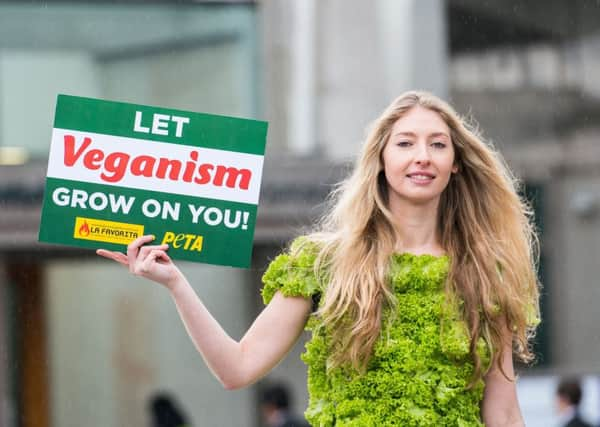Vegans and meat-eaters: Why they need each other '“ Jane Bradley


You would be forgiven for thinking that the whole world has turned vegan. Supermarket shelves are lined with meat substitutes: sausages, steaks and burgers. There’s even, from this week, vegan “fish and chips” in batter on offer from Quorn.
Actually, just seven per cent of the UK population actually identifies as vegan – although that is a 700 per cent increase on two years earlier – according to figures published last year by Comparethemarket.com. Yet there is no doubt there is a growing, and welcome, movement towards plant-based diets, whether for health or environmental reasons.
Advertisement
Hide AdAdvertisement
Hide AdA report out earlier this week claimed that people across the world need to cut down dramatically on meat and dairy consumption.
Yet, like most things in the age of Twitter, it has somehow become a fight: plant-based food vs meat. Vegans versus omnivores. Are you a true vegan or, like my friend, someone who eats an entirely plant-based diet but still owns leather shoes and bags she bought pre-conversion, so is scared to call herself a vegan for fear of being branded a hypocrite?
This week’s report, compiled by 37 scientists forming the EAT-Lancet group, paints a stark picture of what we should be doing to combat climate change. Their suggested daily diet includes just 14 grams a day of red meat, which equates to around two small steaks a month; 29g of chicken; 28g of fish; and 250g of dairy, the equivalent of just one glass of milk; along with about one and a bit eggs a week. On the other hand, 200g of fruit and 300g of vegetables a day would be required to fill us up.
Whether or not the EAT-Lancet’s plan should be followed – and there has been some backlash as to the independence of the investigation – in practice, it never will be, not by everyone.
What people are scared of is extremes. Someone who enjoys a processed-meat fried breakfast every day is not suddenly going to switch to a vegan lifestyle, no matter how many plant emoticons someone tweets at him.
A colleague, not usually known for following a good diet, on 1 January, decided he was to have a massive lifestyle shift. Suddenly, gone were the processed foods and sugar-laden snacks: in came an entire grocer’s worth of fruit and vegetables; packets of unsalted nuts and boxed leftovers from nutrient-rich, home-cooked dinners.
For a couple of weeks, he was a paragon of virtue, swapping healthy-eating tips with his deskmate, a formerly hard-living hack turned tumeric-tea-drinking-almond-milk-quaffing puritan.
But earlier this week, disaster struck. We’re still not clear what caused this dramatic fall from the wagon, but on Wednesday, we found him guzzling a bottle of Lucozade washed down with a packet of Haribo, while he lunched on an entire pack of out-of-date croutons followed by a sausage roll.
Advertisement
Hide AdAdvertisement
Hide AdHe had even, we discovered, covertly reverted to his old habits of scoffing a bacon roll – left over from a morning breakfast meeting buffet, and reheated in the office microwave.
Yet, if he had not taken things to such extremes in the first place, perhaps he would have lasted longer on his health kick, which would have good for not only him, but for the environment too.
Increasingly, the argument for veganism comes from the animal-cruelty angle, rather than anything to do with health or even environmental arguments. For people who feel like this, this is a perfectly valid decision and they are entitled to make it. Yet, there are many who don’t and their views should also be respected. Of course, increasing animal welfare so that those animals we do eat have a better life before they are killed is obviously a positive thing.
At a busy city centre restaurant in Edinburgh this week, my friend (the demi-vegan with the leather shoes) was handed a “vegan and vegetarian menu” along with the a la carte and lunchtime offering from which I chose my meal. More restaurants have this option now – and so they should.
Similarly, many years ago, when I lived in Cardiff, there was an excellent vegetarian restaurant around the corner to my house which offered a single meat option. And why not? They focused on vegetarian food because that was what they did – and very well. But there was one offering which might appeal to some of its other customers who enjoyed meat. It was always busy. I wonder now, in today’s climate, if that restaurant would do as well? I fear it may be boycotted by angry “true vegans” who felt that the restaurant was doing them a disservice.
This is where things are going wrong. We should not ghetto-ise food choices, nor insist on slapping labels on everyone’s lifestyles. If someone is generally vegan, but has a bacon sandwich once a month, who does that actually hurt? There is no need for things to be as cut and dried as whether someone is carniverous or vegetarian.
We need to work together to stop climate change and we will not do that by breaking into camps of vegan and non-vegan, fighting against each other to get the moral upper hand. If most of us just cut down on meat, bought only higher welfare-varieties and ate less processed food, it would be a start, both for our own health and the health of the planet.